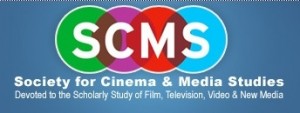Report from SCMS: Saturday
In addi tion to granting Midwesterners like me the chance to reintroduce the concept of sunshine to our bare arms, another one of the advantageous by-products of the Los Angeles setting for the SCMS conference this year has been the opportunity for film and TV industry professionals to join our discussions. Saturday’s sessions offered the mother lode.
tion to granting Midwesterners like me the chance to reintroduce the concept of sunshine to our bare arms, another one of the advantageous by-products of the Los Angeles setting for the SCMS conference this year has been the opportunity for film and TV industry professionals to join our discussions. Saturday’s sessions offered the mother lode.
First up was a morning workshop featuring a set of comic book, TV, and film writers and producers, including Rebecca Dessertine, Scott Peterson, Howard Chaykin, Marc Guggenheim, and Jeff Katz. The session was filled with spirited discussion focusing primarily on the comparative techniques and conditions of writing for film, television, and comics, and the economics and aesthetics of film and TV industry adaptations of comic books. The panelists offered nuggets of knowledge I likely never would have obtained otherwise (such as the tantalizing notion that a comic book adaptation of Mad Men’s first season was proposed but deemed too expensive to pursue); great examples to raise in my classes (such as Katz discussing how during the production of Wolverine, Iron Man became a hit, prompting a flood of studio memos encouraging them to make Wolverine more like Iron Man, then The Dark Night became a hit, prompting another flood of studio memos encouraging them to instead make Wolverine more like The Dark Knight); behind-the-scenes affirmation that film and television have grown more risk-averse and licensing-dependent than ever before (there is a Jolly Green Giant movie in the works – yes, you read that right); and plenty of darn good quotes to file away for future use (Chaykin especially delivered, offering up gems like “TV is a medium that congratulates you for being too hip for TV”).
Midday brought the showrunner-studded transmedia studies and future of TV workshop with Carlton Cuse, Damon Lindelof, Tim Kring, Kim Moses, Javier Grillo-Marxuach, and Mark Warshaw. Co-moderator Henry Jenkins set an appropriate tone from the start by telling the SRO crowd that this would be a substantive academic discussion, not a Comic-Con fan fest, and the panel was indeed a highly edifying look from the creator perspective at the value and challenge of fostering transmedia properties. There was too much information from really smart and articulate people for me to do it justice in this short space, so we’re lucky that the session was recorded. What you can look forward to seeing once that is posted online is a discussion of, among other things, the tensions inherent to serving contrasting audiences, from the mass to the cult; the economic and reception contexts of transmedia properties and the uncertain future of monetizing them; the industrial implications of fragmented audiences, serial storytelling techniques, and piracy; and the impact of fan demands on the creative process. Most striking to me in regard to the latter was the panel’s evident agreement that while it is a positive that fans are empowered by the internet to communicate their opinions about story direction to showrunners willing to listen, those fans have to ultimately trust in the professional storytellers to do their jobs. Grillo-Marxuach remarked, “We cannot abdicate the right to give the audience what they need instead of what they want.”
A few hours after the showrunners and aca-fans cleared out, it was thrilling to see the room fill right back up to SRO capacity for a workshop (also recorded) featuring members of the legendary Los Angeles School of Black Filmmakers, including Charles Burnett, Julie Dash, Barbara McCullough, Cauleen Smith, and Billy Woodberry. Discussing their participation in one of the most important independent film movements in American cinema history, the panelists captivated me with stories about how they leaned heavily on one another for support while at UCLA film school and passed down that community spirit to subsequent generations of filmmakers, as well as how they drew from influences like Italian Neorealism but were driven to create African-American-centered stories that had yet to grace the screen. I’ll be teaching the LA School to my Film History class in a few weeks, and I look forward to passing on to my students the details of the communal spirit that drove these pioneering filmmakers, though I will also have to relate their disheartening stories about the current state of independent filmmaking, as each spoke of struggles to find funding and fair treatment in today’s media landscape.
Overall, I was especially struck by the big crowds attending each of these panels. Just prior to the transmedia workshop, I chatted with Andrew Douglas of the Bryn Mawr Film Institute, who recalled an SCMS conference of a decade or so ago where virtually nobody showed up to hear Arthur Hiller speak on a panel. Perhaps today’s events are a sign that SCMS members are recognizing more than ever before the vital value of being able to connect with industry figures and artists. Or as Douglas speculated, perhaps this has also been facilitated by an explosion in communications technology that has brought the media industries and academia in closer contact. If so, hopefully this means that even future conferences set far away from the film and TV capital can still drew on these burgeoning connections. After all, as Henry Jenkins invoked before introducing the transmedia panel and all of today’s workshops affirmed, in the end we’re all just geeks who share common passions and intellectual curiosity.


